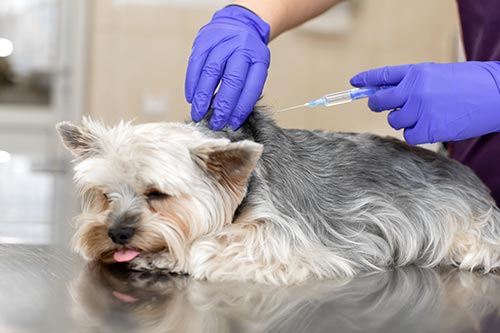Vaccinations are one of the most effective ways to protect pets from serious diseases and ensure their long-term health. Regular pet vaccination not only safeguards your furry friends but also contributes to the well-being of other animals and humans in the community. Understanding the importance, schedule, and types of vaccines available can help pet owners make informed decisions for their pets’ health.
A well-planned vaccination program tailored to your pet’s age, breed, and lifestyle provides essential protection against infectious diseases. Veterinary clinics, like Starlight Vet, offer professional guidance on the vaccines your pet needs and maintain records to ensure timely boosters. Keeping your pet up-to-date on vaccinations reduces the risk of illnesses such as rabies, parvovirus, distemper, and feline leukemia.
Why Vaccinations Are Crucial
Vaccines stimulate a pet’s immune system to recognize and fight off specific pathogens, providing immunity without causing the disease itself. This preventive approach minimizes the likelihood of infections and their associated complications. In addition to protecting individual pets, vaccination plays a vital role in preventing outbreaks and maintaining public health, especially in densely populated areas.
For pets that interact with other animals or frequently visit parks and grooming centers, vaccinations are particularly important. Certain diseases, such as rabies, are zoonotic, meaning they can be transmitted from animals to humans. Vaccinating pets is therefore a responsibility that safeguards both animal and human health.
Core and Non-Core Vaccines
Vaccines are categorized into core and non-core types. Core vaccines are essential for all pets regardless of lifestyle, providing protection against highly contagious and potentially fatal diseases. For dogs, core vaccines typically include rabies, canine distemper, adenovirus, and parvovirus. For cats, core vaccines often include rabies, feline herpesvirus, calicivirus, and panleukopenia.
Non-core vaccines are recommended based on your pet’s specific risk factors. For instance, dogs that spend a lot of time outdoors or in boarding facilities may benefit from vaccines against leptospirosis or kennel cough. Cats with outdoor access may require additional protection against feline leukemia virus. A veterinarian can assess your pet’s lifestyle and advise on the appropriate combination of vaccines.
Vaccination Schedule
Puppies and kittens generally receive their first set of vaccines at 6 to 8 weeks of age, followed by booster doses every 3 to 4 weeks until around 16 weeks. Adult pets require regular boosters to maintain immunity. Annual or triennial boosters are common depending on the type of vaccine and regional regulations.
Maintaining a vaccination schedule is essential for optimal protection. Delays or missed doses can leave pets vulnerable to preventable diseases. Many veterinary clinics provide reminders and digital records to help pet owners stay on track with their pet’s immunizations.
Preparing Your Pet for Vaccination
Before vaccination, ensure your pet is healthy and free from any active illness. A thorough veterinary examination helps determine if your pet is fit to receive vaccines. Pets with compromised immune systems, fever, or infections may need to postpone vaccination to avoid adverse reactions.
Discuss any previous vaccine reactions with your veterinarian. Some pets may require specific protocols to reduce the risk of side effects. Proper preparation ensures a safe and stress-free experience for both the pet and owner.
Monitoring After Vaccination
Mild side effects, such as temporary lethargy, mild fever, or localized swelling at the injection site, are normal and typically resolve within a day or two. Serious reactions are rare but can include difficulty breathing, persistent vomiting, or facial swelling. Contact your veterinarian immediately if any severe symptoms occur.
Post-vaccination monitoring also involves keeping accurate records of all doses received. This information is crucial for boarding, travel, or participation in public events where proof of vaccination is required.
Additional Preventive Measures
While vaccinations are vital, they work best in combination with other preventive measures. Regular parasite control, proper nutrition, exercise, and routine veterinary checkups complement the protective benefits of vaccines. Educating yourself about your pet’s specific health needs enhances overall wellness and longevity.
Conclusion
Regular pet vaccination is a fundamental component of responsible pet ownership. By following a veterinarian-recommended schedule and maintaining accurate records, pet owners can protect their pets from serious diseases, promote public health, and enjoy peace of mind. Partnering with a professional veterinary clinic ensures that your pets receive safe, effective, and timely vaccinations, supporting their long-term health and happiness.

